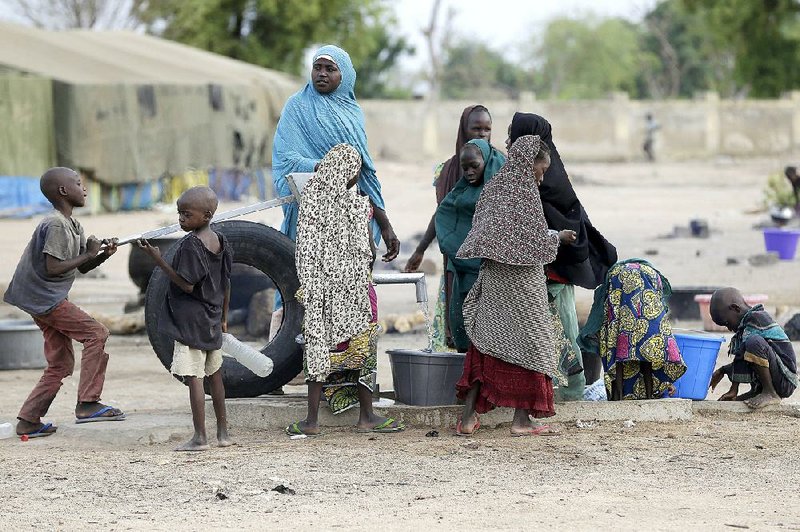YOLA, Nigeria -- Boko Haram fighters stoned some of their captives to death as Nigeria's military approached to rescue the women, survivors said Sunday.
Several women died when they were crushed mistakenly by a Nigerian military armored car.
And three were blown up by a land mine as they were walking to freedom.
These stories come from girls and women taken to a refugee camp in Yola who still find it hard to believe they are safe, some after more than a year in the hands of Nigeria's homegrown Islamic extremists.
"We just have to give praise to God that we are alive, those of us who have survived," said Lami Musa, 27, as she cradled her 5-day-old baby girl.
She was among 275 girls, women and their young children, many bewildered and traumatized, who were getting medical care and being registered Sunday on their first day out of Nigeria's war zone.
Nigeria's military said it has freed nearly 700 Boko Haram captives in the past week.
It's still unclear if any of them were among the so-called Chibok girls, whose mass abduction from their school a year ago sparked anger worldwide and a campaign for their freedom under the hashtag #BringBackOurGirls.
Musa was in the first group to be transported by road over three days to the safety of Malkohi refugee camp, a dust-blown deserted school set among baobab trees on the outskirts of Yola, the capital of northeastern Adamawa state.
Musa had just given birth to her yet-to-be-named baby last week when the crackle of gunfire hinted rescuers might be nearby.
"Boko Haram came and told us they were moving out and said that we should run away with them. But we said no," she explained from a bed in the camp clinic.
"Then they started stoning us. I held my baby to my stomach and doubled over to protect her."
She and another survivor of the stoning, Salamatu Bulama, 20, said several girls and women were killed, but they do not know exactly how many.
The horrors did not end once the military arrived. A group of women were hiding under some bushes. They could not be seen by the soldiers in an armored personnel carrier who drove right over them.
"I think those killed there were about 10," said Bulama.
Other women died from stray bullets, she said, identifying three by name.
The women and children were rescued by the military from the Sambisa Forest, the last stronghold of the Islamic extremists, when soldiers destroyed more than a dozen insurgent camps in the forest, Nigeria's military said.
There were not enough vehicles to transport all of the freed captives and some women had to walk, Musa said.
Those on foot were told to walk in the tire tracks made by the convoy because Boko Haram militants had placed mines in much of the forest. But some of the women must have strayed because a land mine exploded, killing three, she said.
Bulama cried when she thought about another death in the camp: Her only son, a 2-year-old who died two months ago of an illness she said was aggravated by malnutrition.
"What will I tell my husband?" she sobbed after learning from other survivors who used borrowed cellphones to try to trace relatives that her husband was alive and in the northern town of Kaduna.
Musa said her husband, the father of the new baby, was killed by Boko Haram when they abducted her from her village of Lassa in December. She doesn't know the fate of their three other children.
At the camp, 21 girls and women with bullet wounds and fractured limbs were taken to the city hospital after they arrived Saturday evening.
On Sunday, officials were collating details of the rescued 61 women and 214 children, almost all girls.
Health workers put critically malnourished babies on intravenous drips; babies whose rib cages and shoulder blades protruded were given packs of therapeutic food to suck from.
Many of the rescued said they had been taken captive in the past nine months, when Boko Haram had seized a large swath of northeastern Nigeria and declared it an Islamic caliphate.
Elsewhere, community leaders accused Nigerian troops of killing dozens of civilians and razing homes to avenge the deaths of six soldiers.
Traditional ruler Chief Jessie Miri said up to 80 people were killed in multiple attacks by soldiers over the weekend in Wase district of central Plateau state.
Spokesman Capt. Ikwedichi Iweha denied the special task force attacked any civilians, asking why they would attack people they were there to protect.
Residents said the soldiers arrived in more than a dozen armored personnel carriers. Some tied the attacks on villagers of the Tarok tribe to Thursday's killings and mutilations of six soldiers by Tarok youths.
Information for this article was contributed by staff members of The Associated Press.
A Section on 05/04/2015
